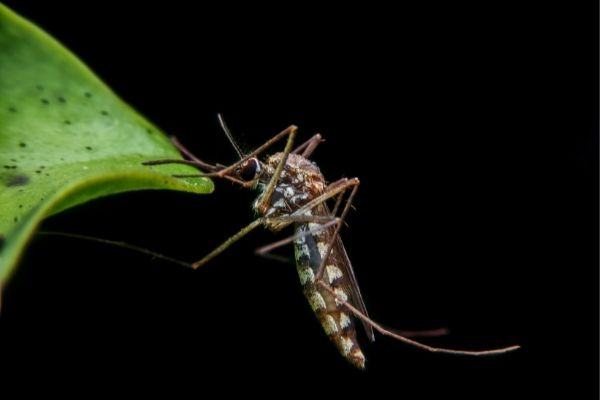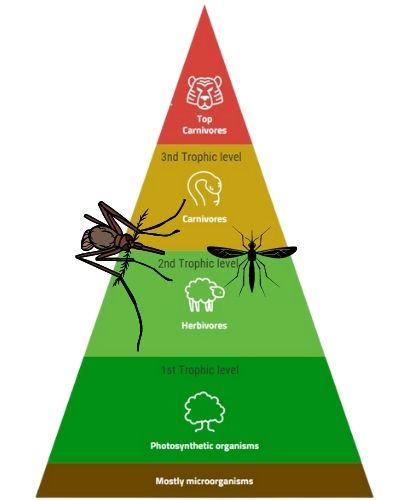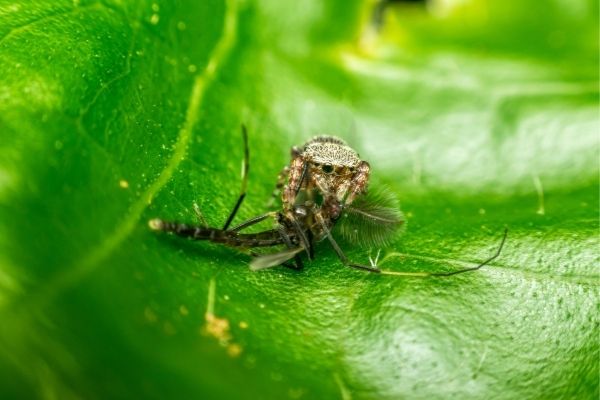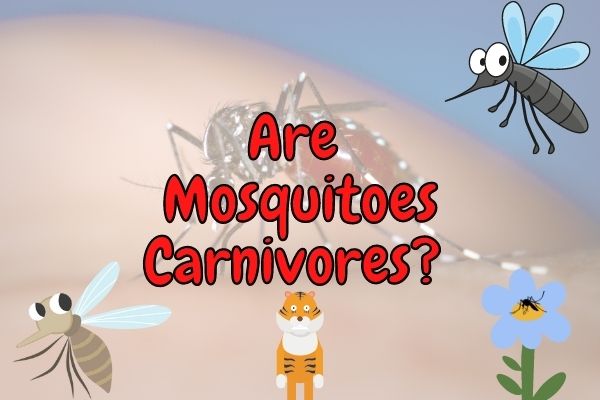Mosquitoes as a group are omnivorous insects that are found all over the world. They are considered to be one of the most dangerous animals on the planet due to their ability to transmit diseases like malaria, dengue fever, and yellow fever.
But do they do not mainly eat blood although it might sometimes feel like that!
Mosquitoes mostly feed on nectar or sap from plants, but they will consume blood from animals occasionally and some mosquito larvae are carnivores.
Female mosquitoes need blood for a short time period in order to produce eggs, so they are the ones that typically bite humans and other animals, but they are not primarily carnivores.
Male mosquitoes do not bite animals since they do not require blood for reproduction and are mainly herbivores.
While mosquitoes can feed on a variety of different things, they prefer certain types of food depending on their stage in life.
For example, larvae tend to eat small aquatic creatures like algae and zooplankton. Adults usually feed on nectar or sap, and they will only drink blood when needed for their reproduction.
Contents
Why are mosquitoes important for the ecosystem?
As one of the most widespread animals on Earth, mosquitoes play an important role as food and pollinators in many different ecosystems.
They are known to be carriers of diseases like malaria and yellow fever, which can have devastating effects on human populations. However, they are not just bad as they do also serve as a food source for many other animals, including bats, dragonflies, and frogs.
Without mosquitoes, these animals would not have a food source, and their populations would decline. This would then have a ripple effect on the entire ecosystem, as these animals play an important role in keeping it balanced.
For example, bats help control the mosquito population by eating them. If there were no mosquitoes for them to eat, their population would increase and they would start to eat other insects that are important for pollination or pest control.
This could lead to a decline in plant life or an increase in crop damage from pests.
So while most people would rather be without mosquitoes and they may not be the most popular animal out there, they do play an important role in keeping our ecosystems healthy and balanced.
Do all mosquitoes suck blood?
Mosquitoes (Culicidae) are insects that belong to the order Diptera. They are closely related to flies, but possess a slender body with 3 pairs of jointed legs.
The mouthparts are adapted for sucking blood or plant sap and the wings are broad and are held roof-like over the abdomen at rest.
There are over 3,000 species of mosquitoes, but only a few of them actually suck blood! The taxonomy and phylogeny of the mosquitoes are somewhat complicated, because mosquitoes are vectors for diseases that cross species boundaries.
Consequently, the mosquitoes that carry these diseases are called ‘vector mosquitoes’ and tend to be highly host-specific. They are vectors of a number of human diseases such as malaria, dengue fever, yellow fever, Japanese encephalitis, filariasis, and various forms of encephalitis.
This means that those that sting animals will rarely also feed on humans as well – and luckily there are relatively few species that feed on humans!

Mosquitoes that carry diseases that affect humans tend to be in the genus Anopheles (Marsh Mosquitoes), while those that carry diseases that affect other animals tend to be in the genus Culex.
However, there are numerous exceptions to these generalizations, which is why it is generally not possible to identify a mosquito merely by knowing its genus.
Are Mosquitoes Carnivores, Herbivores or Omnivores?
Mosquitoes are generally omnivores because they eat both plants and animals. Whereas female mosquitoes are blood feeders, they do eat nectar and sap most of the time.
Male mosquitoes however are purely herbivorous as they do not suck blood but only nectar and sap.
Some mosquitoes are cannibal carnivores!
Some mosquito larvae will eat the larvae of other mosquitoes and are therefore carnivores. This is the case for the so-called “elephant mosquitoes” also known as the “mosquito eater” (Toxorhynchites rutilus).

Toxorhynchites are named so due to its large size and its proclivity towards eating other mosquitoes!
Whereas the adult are herbivores and live from pollen and sap, the larvae predominantly feed on mosquito larvae of other species!
Why do mosquitoes need to drink blood?
Mosquitoes require blood for two main reasons: to develop their eggs and to obtain protein. When a mosquito pierces the skin of its victim in order to feed, it also injects saliva into the wound.
The blood contains the proteins and nutrients necessary to quickly develop and mature a high number of eggs that the female mosquito can lay.
A female mosquito will typically lay her eggs in stagnant water, and when these eggs hatch, the larvae will feed on small organisms in the water.
Once they mature into adults, however, mosquitoes must find a blood meal in order to reproduce.
Is a Mosquito a Producer, Consumer, or Decomposer?
A mosquito is classified as a consumer. In ecological terms, consumers are organisms that obtain their energy by consuming other organisms.
Mosquitoes are insects that feed on the blood of other animals, including humans, as their primary source of nutrition. They have mouthparts specially adapted for piercing the skin of their hosts and sucking blood.
Producers, on the other hand, are organisms that produce their own food through photosynthesis, such as plants and algae. They convert sunlight, water, and carbon dioxide into energy-rich molecules, like glucose, using the process of photosynthesis.
Decomposers, meanwhile, are organisms that break down dead organic matter and recycle nutrients back into the environment. They play a vital role in the decomposition process by breaking down complex organic compounds into simpler forms that can be reused by other organisms. Examples of decomposers include bacteria, fungi, and certain types of insects, but mosquitoes do not fall under this category.
What Type of Consumer is a Mosquito?
All mosquitoes are consumers because they eat other living things.
Female mosquitoes are secondary consumers that eat both plants and animals and males are primary consumers that only feed on plant sap.
Mosquitoes are classified as hematophagous insects, meaning they feed on the blood of other animals. They are part of the order Diptera, family Culicidae, and there are over 3,500 known species of mosquitoes. While many people consider mosquitoes to be pesky pests, they play important ecological roles in various ecosystems.
Mosquitoes exhibit sexual dimorphism, meaning there are distinct differences between males and females. Females are the primary consumers of blood, as they require certain nutrients found in blood to develop their eggs.
Males, on the other hand, primarily feed on nectar and other plant juices. Thus, it is the female mosquitoes that are most commonly associated with feeding on the blood of animals, including humans.
Different mosquito species have varying preferences for their hosts. For instance, the Aedes aegypti mosquito is known for transmitting diseases such as dengue, Zika, and yellow fever. It tends to be highly attracted to humans and is most active during the day.
Another example is the Anopheles mosquito, which is responsible for transmitting malaria. These mosquitoes typically feed on mammals, including humans, and are most active during the evening and night.
While male mosquitoes do not consume blood, they still play a vital role in the ecosystem as pollinators.
They feed on nectar from flowers, thus aiding in the process of pollination. Male mosquitoes also require sugar from plant sources to obtain energy for survival.
It is important to note that not all mosquito species feed on humans or mammals. Some species specialize in feeding on birds, reptiles, amphibians, or even other insects. For instance, the Culex pipiens mosquito commonly feeds on birds and is a vector for avian diseases like West Nile virus.
Mosquitoes have developed various adaptations that enable them to successfully locate and feed on their preferred hosts. They possess specialized sensory organs, such as antennae and mouthparts, that help them detect carbon dioxide, body heat, and other chemicals emitted by potential hosts. These adaptations allow mosquitoes to locate their hosts over relatively long distances.
In conclusion, mosquitoes, particularly female mosquitoes, are hematophagous insects that consume blood for the purpose of egg development. Different mosquito species have varying preferences for hosts, and while some species, such as Aedes aegypti and Anopheles mosquitoes, are associated with human blood feeding and disease transmission, others specialize in feeding on different animals.
Male mosquitoes primarily feed on nectar and serve as pollinators. Despite their reputation as pests, mosquitoes play significant roles in various ecosystems and serve as a vital component of the food web.
Is a mosquito a decomposer?
No. Mosquitoes do not eat dead or decaying matter and are therefore not decomposers. Some mosquitoes may, however, feed on the juices of dead animals but they do primarily feed on live animals.
Interestingly, the larvae of mosquitoes, while living in water, may consume dead plant or animal particles called detritus, and as such may function as decomposers or detritivores in that stage of their life cycles.
Some mosquito larvae, however, are purely carnivorous, eating only animal matter including other mosquito larvae!
Where are Mosquitoes in the Food Chain?
Female mosquitoes can be considered secondary consumers that eat both plants and animals, whereas the males belong to the lower trophic level of herbivores.

Mosquitoes are typically considered a part of the food chain as both predators and prey. Let’s examine their position in the food chain:
- Mosquito larvae: Mosquitoes start their life cycle as larvae in aquatic environments such as ponds, lakes, and stagnant water. At this stage, they are often consumed by a variety of organisms, including small fish, tadpoles, aquatic insects, and some species of birds.
- Adult mosquitoes: Once they reach the adult stage, mosquitoes primarily feed on plant nectar and other sugary substances to obtain energy. However, only female mosquitoes require a blood meal to obtain the necessary proteins for egg production. They typically feed on the blood of various animals, including mammals, birds, reptiles, and amphibians. By feeding on blood, female mosquitoes contribute to the transfer of energy and nutrients from one part of the food chain to another.
- Predators: Mosquitoes serve as a food source for many predators. Numerous organisms rely on mosquitoes as part of their diet. For example, insect-eating birds like swallows, martins, and certain species of bats consume mosquitoes as a significant portion of their diet. Additionally, various insectivorous insects, spiders, and some small mammals also feed on mosquitoes.
- Parasites: Mosquitoes can also play a role in transmitting diseases as they act as vectors for certain parasites. When a mosquito feeds on an infected animal or human, it can pick up parasites such as protozoa (e.g., malaria parasites) or viruses (e.g., dengue, Zika) from the host. When the mosquito subsequently bites another individual, it can transmit the pathogens, potentially causing disease.
In summary, mosquitoes occupy various positions within the food chain. They are prey for many organisms, particularly during their larval stage, and they serve as a food source for predators such as birds and bats.
However, as disease vectors, mosquitoes can also indirectly affect the food chain by transmitting parasites and pathogens to other animals.
Because they are secondary consumers, they are placed on the third trophic level in the energy pyramid.
This means that they are also hunted by numerous predators.
What Animals Prey on Mosquitoes?
There are many animals that eat mosquitoes as part of their diet, including birds, bats, dragonflies, spiders, and frogs.

Mosquitoes have a wide range of predators in various stages of their life cycle. Here are some animals that prey on mosquitoes:
- Birds: Many bird species include mosquitoes as part of their diet. Swallows, purple martins, nighthawks, and certain species of warblers and flycatchers are known to consume large numbers of mosquitoes.
- Bats: Bats are voracious insect predators, including mosquitoes. They use echolocation to locate and catch mosquitoes on the wing, making them effective mosquito controllers.
- Dragonflies and Damselflies: Both dragonflies and damselflies are skilled hunters and feed on mosquitoes in their larval and adult stages. Dragonfly larvae are aquatic and consume mosquito larvae in ponds and other water bodies, while adult dragonflies catch mosquitoes in flight.
- Fish: Some fish species feed on mosquito larvae in water bodies. Gambusia affinis, commonly known as mosquito fish, is particularly known for its appetite for mosquito larvae. They are often used as a biological control method in mosquito-infested areas.
- Predatory Insects: Various predatory insects prey on mosquitoes. For example, certain species of beetles, ants, and predatory mosquito species like Toxorhynchites use mosquitoes as a food source.
- Spiders: Certain spider species, such as orb-weaving spiders, actively catch mosquitoes and other flying insects in their webs.
- Frogs and Tadpoles: Mosquito larvae are a common food source for certain frog species and their tadpoles. These amphibians inhabit water bodies and consume mosquito larvae as part of their diet.
It’s important to note that the effectiveness of these predators in controlling mosquito populations can vary depending on the specific ecosystem and environmental factors.
Additionally, while these animals contribute to mosquito control, they may not completely eliminate mosquito populations on their own.
Many fish and birds also eat the larvae of mosquitoes and, as mentioned earlier, mosquito larvae of the genus Toxorhynchites eat other mosquitos in their larvae state!
Are Mosquitoes Autotrophs or Heterotrophs?
Mosquitoes are heterotrophs because they eat other living organisms. Practically no animals are autotrophic because animals do not get their energy directly from the sun as plants do. That is, animals like the mosquito cannot make their own energy!
Conclusion
In this blog post, I have looked at the diet of the mosquito as a very important consumer of blood and nectar.
Mosquitoes are very important because they are predators of other animals. They are also important pollinators!
There are many different species of mosquito, but the most common ones are the African and Asian species. They are very different from each other and can be distinguished by the shape of their wings.
Mosquitoes are very important for the ecosystems in which they live, but they are also very important for us, as they can carry diseases and parasites.
You may also be interested in my other posts on the diversity of other insects and arthropods and their role in the food chain!





